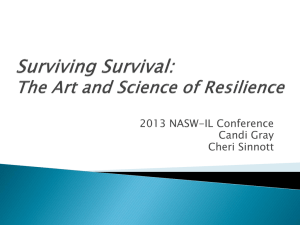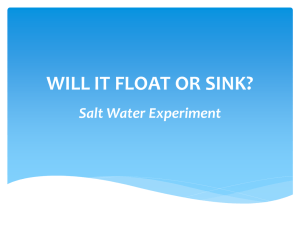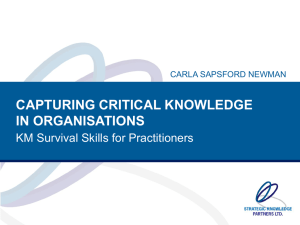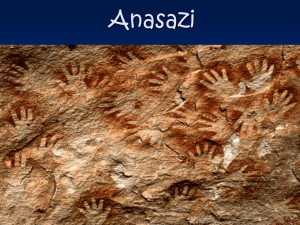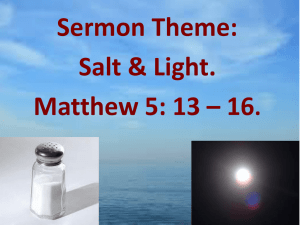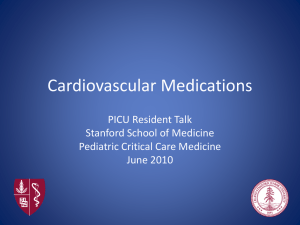Survival
advertisement
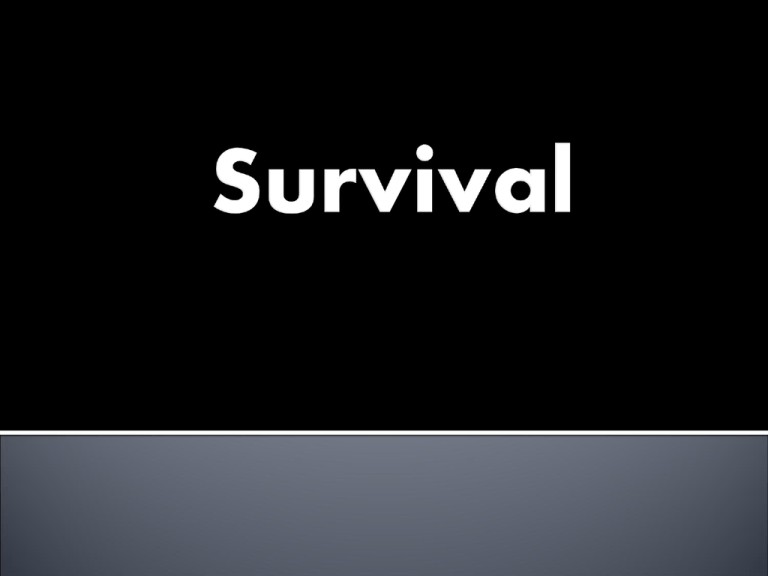
S-Size Up the Situation Size up three different things: -Your surroundings: determine the pattern of the area. -Your physical condition: take care to prevent bodily harm. Drink plenty of water, and in cold or wet climates put on more clothing to prevent hypothermia. -Your equipment: check to see what equipment you have and what condition it’s in. Keep in mind basic physical needs- water food and shelter U-Use All Your Senses,Undue Haste Makes Waste Reacting quickly without thinking can be life-threatening. Don’t move just for the sake of taking action. Plan your moves and use all your senses to evaluate a situation. BE OBSERVANT!! What you don’t know, can hurt you. R-Remember Where You Are A basic principle to follow is, spot your location on a map and relate it to the surrounding terrain. Constantly orient yourself and try to determine how your location relates to the location of local water sources. V-Vanquish Fear If left uncontrolled fear and panic can destroy your ability to make an intelligent decision. They cause you to react to your feelings and can drain your energy causing other negative emotions such as hopelessness, anxiety, and paranoia.”No passion so effectively robs the mind of all its powers of acting and reasoning as fear”-Edmund Burke I-Improvise Learn how to improvise, take a tool designed for a specific purpose and see how many other uses you can make of it. Learn how to use natural objects around you. Nothing is useless when survival is the issue. V-Value Living The number one necessity of life is the Will to Live/ Positive Mental Attitude (PMA). If all priorities are maintained but you lack the will to live then all is lost. The power of the mind must never be underestimated. Sometimes its seems like death is the easiest way out during periods of extreme mental and physical stress. People have to power to will themselves to death, as to live. A-Act Like the Natives Animal life in the area can give you clues on how to survive, by watching them you can find sources of food and water. Remember that animals cannot serve as an absolute guide to what you can eat and drink. Some animals eat plants that are toxic to humans L-Live By Your Wits, But for Now, Learn Basic Skills Without training basic skills the chances of living are slim. Practice basic survival skills. Survival training reduces fear of the unknown and gives you self confidence. It teaches you to live by your wits. Develop a survival pattern, it must include food, water, shelter, fire, first aid, and signals. If you are injured first aid has top priority, no matter what climate you are in. The necessities of life in order are 1)Will to Live/ Positive Mental Attitude- the rest wont matter if you don’t want to live 2)Air/Oxygen- you can only survive 3-5 minutes without air 3)Shelter, clothing, and warmth 4)Rest- both physical and mental rest are needed 5)Signals 6)Water- you can survive without water for 3 days at most 7)Food-you can go without food for 3-4 weeks Survival at sea is about Staying alive long enough to reach safety. To do so, you need to know the main factors that endanger your survival and the techniques and equipment needed to overcome them and most importantly, to maintain the right attitude and keep the will to survive. Preparation for a sea survival situation has three aspects Knowledge Equipment Attitude If a sea survivor is thoroughly prepared for their ordeal, knows what to expect and how to deal with it, they will not be beaten Learning gives you the ability to share knowledge rather than having to start from scratch every time. In order to stay alive you must be aware of the four main enemies to survival. In order of priority they are Drowning Exposure Thirst Hunger Drowning is the ocean’s number one killer. Your body cannot function without oxygen being transported by blood to vital organs. Without sufficiently oxygenated blood the brain will become hypoxic, causing unconsciousness, brain damage, and then a coma within minutes However when we are immersed in water your lungs help keep you afloat, and if your head or at least your face is kept above the water, you can inflate your lungs and stay afloat. Above all, it is important that you stay calm. Panic increases the body’s demand for oxygen. Panicking reduces the oxygen intake, because your breathing quickens but also becomes shallower. As you panic you wear out you body and become exhausted, then you will lose the energy to stay afloat, and drown The normal human body has a core temperature of 98.4°F It is important that your body's core temperature be kept as close to normal as possible in a survival environment. There are two types of exposure Cold Heat When a body is immersed in water, it loses heat up to 25 times faster than it does in air The greater the difference between body temperature and water temperature, the greater the rate of heat loss When you get cold your body triggers defense mechanisms First your body shivers, a reflex intended to restore the body to its normal temperature. By contracting muscles, large amounts of heat are produced. If your body’s core temperature drops below 95°F the body becomes hypothermic. Symptoms Become numb with cold and shiver intensely Impaired motor function and coordination Slurred and slow speech Impaired mental function Poor decision making Difficulty concentrating Vasoconstriction (constricted blood vessels) ▪ Vasoconstriction leads to frostbite If core temperature continues to drop survival becomes less likely At 89.9° F the body’s defense mechanisms begin to fail Shivering will be replaced by muscle rigidity and cramping The most dangerous thing is when vasoconstriction fails because this allows the blood to return to the extremities, lowering blood pressure and slowing the pulse and rate of respiration Blood will lose more heat as it passes through the cold extremities and then the cold blood will circulate around the vital organs impairing them even further By then you will become confused, disoriented, apathetic and eventually unconscious. Death occurs if the core temperature drops below 77° F Apathy is the most important and worrying sign, it indicates that the will to survive has been extinguished, without it, we die. Exposure to heat is potentially more dangerous than cold because it involves sweating. Slight rise of core temperature causes veins near the surface of the skin to expand, increasing the amount of blood near the surface of the skin. If your core temperature rises between 0.5-1°F your sweat glands start secreting sweat Sweat is made up of salt and water. If sweating fails to return the body’s core temperature to normal, the effects of the loss of salt and water start to show. After sweating for awhile you will experience cramping which is a result of losing salt. You can prevent this by taking salt tablets with you. Then find a place of shade to rest. If the salt isn't replaced you will experience heat exhaustion, which is a form of shock. As water and salt are lost your blood thickens and blood pressure drops, which reduces the blood flow to vital organs. You will become cold and clammy and may get a headache, feel dizzy, confused, and drowsy, it will leave you feeling weak and drained. Heat stroke will follow if correct action isn't taken. To counter the drop in blood pressure the blood vessels widen, called vasodilation (opposite of vasoconstriction), and heart rate increases. As fluid and salt levels decrease the blood thickens further, this means sweating has failed. Skin will now feel dry and hot as the heart beats faster to try to raise blood pressure The lack of oxygen to the brain leads to unconscious, hypoxic brain damage, and eventually death Heat exposure also includes UV radiation, and if you don’t protect your skin, it will result in sunburn Sunburn is usually a first-degree burn because only affects the skin, but it can be uncomfortable and extremely painful, and can sap morale Another risk of UV rays is sun blindness UV radiation is reflected by the water and after as little as six hours can burn the cornea. Sun blindness has a gritty feeling as if you got sand in your eyes, and your vision may deteriorate To prevent this, wear sunglasses Another type of exposure is salt water. No matter how hard you try, at sea, you will have contact with salt water. Saltwater sores usually first occur on feet, knees, elbows and hands, and then it spreads to the rest of the body. Putting on waterproof sunscreen provides some relief but it will eventually get rubbed off Do NOT try to drain the resulting boils, they will become open sores and the ulcerate If broken skin is exposed to salt water, it will not heal, it will become infected, scabrous and filled with pus. The scabs should NOT be broken as it leads to ulceration. Antiseptic ointment should be applied and sea water should be kept away from the wound When at sea, sources of fresh water may not be readily available and your reserve supplies are unlikely to be enough. In stressful situations your body increases the production of adrenaline, as a result Pupils dilate to increase visual activity Sense of hearing sharpens Heart rate rises Vasodilation for vital organs Vasoconstriction for skin Increased amount of oxygen in blood Digestion shuts down Raised metabolism Water in urine is reabsorbed into body tissue This response cannot be maintained for long periods of time. To prevent loss of water you should take seasickness pills as not to lose fluids through vomiting. If you do have to vomit then vomit into a bag that can be sealed- vomiting overboard will attract sharks You are also likely to become constipated, possibly for several weeks. You should resist the urge to urinate, but if you have to do it into a container. Urinating overboard increases the chances of falling out and attracts sharks. To save water in the long term you must reduce water loss such as sweating. Reduce activities to a bare minimum. Water will be the single most important factor in your life at sea Hunger comes is a very distant second to thirst. Hunger is painful, but its malnutrition that kills. Once your stores of fat are burned up to produce energy, your body will start drawing energy from breaking down proteins in muscles, leading to muscle wastage and physical weakness. Without insulating fat or the capacity to generate heat by shivering, the body is more susceptible to the effects of cold. Your life raft will attract food so you will not go hungry at sea. The majority of the oceans food sources are rich in protein. If you lack adequate water, do not eat protein.



